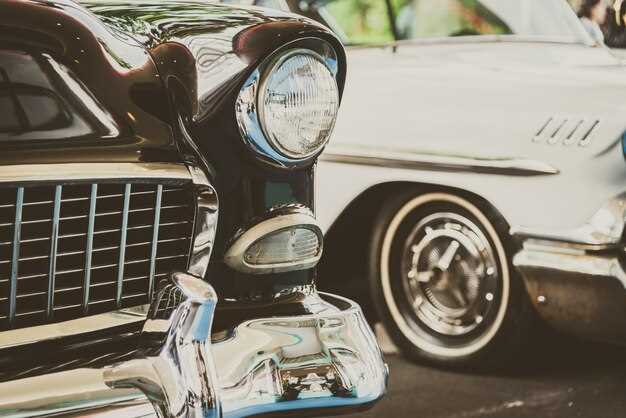
Classic cars are not just vehicles; they are embodiments of history, craftsmanship, and nostalgia. For enthusiasts and collectors alike, owning a classic car is a dream that often requires careful planning and research. Whether you are a first-time buyer or a seasoned collector, understanding the nuances of the classic car market is essential for making an informed purchase.
This guide is designed to provide you with the key insights and practical steps needed to successfully navigate the world of classic cars. From identifying your ideal vehicle to negotiating the best price, we will cover the critical aspects that matter most when searching for your perfect classic ride. Knowledge is power, and in the realm of classic cars, being informed can save you both time and money.
We will explore various resources available for finding classic cars, including online platforms, auctions, and car shows. Furthermore, we will discuss how to assess a car’s condition, the importance of thorough inspections, and the paperwork involved in making a legitimate purchase. By the end of this guide, you will be equipped with the tools to confidently embark on your journey to owning a timeless classic.
Researching Classic Car Market Trends and Values

When venturing into the classic car market, understanding trends and values is crucial for making informed purchasing decisions. The value of classic cars can fluctuate based on various factors including make, model, condition, and market demand. To ensure a successful investment, extensive research is essential.
1. Utilize Online Resources: Numerous websites provide valuable information on classic car valuations, including auction results, sales figures, and expert appraisals. Websites like Hemmings, Classic Cars.com, and Bring a Trailer offer detailed listings and insights into current market trends.
2. Attend Car Shows and Auctions: Participating in classic car shows and auctions can provide firsthand experience of the market. Observing live auctions gives insight into buyer interest and pricing trends. Engaging with fellow enthusiasts can also yield information about value appreciation or depreciation for specific models.
3. Explore Car Clubs and Forums: Joining classic car clubs and online forums allows access to a wealth of knowledge from seasoned collectors. Members often share their insights on market trends, restoration costs, and where to find specific vehicles. Networking with other enthusiasts can provide leads on valuable purchases as well.
4. Analyze Historical Data: Reviewing historical sales data can help identify long-term trends in specific models. Certain brands and models tend to appreciate faster than others, influenced by factors such as rarity, historical significance, and desirability among collectors. Use auction results and price guides like the Hagerty Price Guide for thorough analysis.
5. Understand Market Cycles: The classic car market often experiences cyclical trends influenced by economic conditions. Awareness of these cycles can assist in determining the optimal time to buy or sell. Economic downturns may present opportunities to acquire classic cars at lower prices, while rising markets can lead to increased values.
6. Consider Condition and Restoration: The condition of a classic car significantly impacts its value. Cars in original, unrestored condition may be more desirable, while those that have been meticulously restored can command higher prices. Understanding how restoration and modifications affect value is crucial for both purchasing and selling.
In conclusion, thorough research into market trends and values is essential for anyone looking to enter the classic car arena. By leveraging online resources, attending events, engaging with communities, analyzing data, recognizing market cycles, and assessing vehicle condition, potential buyers can make informed choices that will yield both satisfaction and financial viability in their classic car investments.
Evaluating Condition and Authenticity Before Making a Purchase

When considering the purchase of a classic car, thorough evaluation of both its condition and authenticity is crucial. This assessment will not only influence the car’s value but also your overall satisfaction with the investment.
Start by conducting a comprehensive visual inspection. Look for signs of rust, dents, scratches, or any mismatched paint that may indicate previous bodywork. Pay close attention to critical areas such as wheel arches, undercarriage, and engine bay. Utilize a magnet to check for hidden body repairs; regions with filler may not attract the magnet, revealing potential issues beneath the surface.
Next, assess the car’s mechanical components. Test the engine for smooth starts and idle, listen for unusual noises, and check for leaks underneath the vehicle. Inspect the transmission for responsiveness during shifting and ensure the brakes function efficiently. A thorough evaluation of the suspension and steering systems is also essential for understanding the car’s overall performance and safety.
Documentation plays a vital role in verifying authenticity. Request service records, original manuals, and any restoration receipts. Check the Vehicle Identification Number (VIN) to ensure it matches the documents and confirms the car’s history. Original parts increase the car’s value, so verify the presence of key components such as the engine, gearbox, and other significant parts based on their original specifications.
Consider hiring a professional appraiser or mechanic with classic car expertise. They can provide insights into the car’s historical significance, condition, and authenticity, ensuring you receive a well-rounded evaluation. Engaging with classic car clubs or online communities can also offer valuable resources and experiences shared by fellow enthusiasts.
Carefully weigh the cost of any necessary repairs or restoration against the car’s asking price to determine if it’s a sound investment. An informed decision during this evaluation process can lead to a rewarding ownership experience.
Navigating Legalities and Paperwork for Classic Car Acquisition
The process of acquiring a classic car involves several legalities and paperwork that must be handled meticulously to ensure a smooth transition of ownership. Understanding these requirements is crucial for both novice and seasoned collectors.
1. Research Ownership History: Before purchasing, investigate the vehicle’s ownership history. This includes verifying the title and checking for any outstanding liens. A clear title signifies that the seller has the right to sell the car. Use the Vehicle Identification Number (VIN) to obtain this information from state databases or vehicle history report services.
2. Bill of Sale: A bill of sale is a critical document that includes details of the transaction, such as the buyer’s and seller’s information, vehicle description, sale price, and signatures of both parties. This document serves as proof of purchase and should be retained for future reference, especially for registration and insurance purposes.
3. Emissions and Safety Regulations: Classic cars often have different regulations compared to modern vehicles. Ensure compliance with local emissions and safety regulations. Some states may have exemptions for vehicles above a certain age, while others may require modifications or inspections. Familiarize yourself with the laws in your area prior to purchase.
4. Registration Process: Once you acquire the car, the next step is registration. Provide necessary documentation, including the bill of sale, the previous title, and any required inspections. Fees may vary based on your location and the age of the vehicle. Prompt registration prevents potential legal issues, such as fines or penalties for driving an unregistered car.
5. Insurance Considerations: Classic cars often require specialized insurance coverage. Research insurance providers that offer classic or collector car policies, which typically consider the car’s age, rarity, and condition. Ensure your policy meets the necessary legal requirements and provides adequate protection against potential risks.
6. Taxes and Fees: Be aware of any taxes or fees associated with the purchase. Sales tax rates can vary by state and locality. Consult your state’s Department of Motor Vehicles (DMV) for information on applicable taxes when transferring ownership. Budget for these costs to avoid surprises during the acquisition process.
7. Potential Challenges: Be prepared for potential legal challenges, such as disputes over ownership or the car’s authenticity. Document all communications with the seller and keep records of the transaction to protect yourself from future claims. Engaging with legal professionals experienced in classic car transactions may be beneficial, especially for high-value purchases.
Navigating the legalities and paperwork involved in classic car acquisition requires diligence and attention to detail. By following these guidelines and ensuring all documents are in order, buyers can enjoy their classic car with peace of mind.
